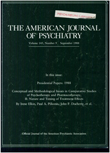Alexithymia: an experimental study of cerebral commissurotomy patients and normal control subjects
Abstract
This study assessed alexithymia in six patients with complete cerebral commissurotomy, two patients with partial commissurotomy, and eight matched control subjects. Comparisons were based on content-analytic measures of the subjects' spoken and written responses to a film that symbolically represented death and loss. The commissurotomized patients were more alexithymic on all four lexical-level variables, all six sentential-level variables, and all six global-level variables. Discriminant function analysis found a linear combination of four variables that effectively discriminated groups of fully commissurotomized, partially commissurotomized, and normal control subjects and correctly classified 15 of the 16 subjects.
Access content
To read the fulltext, please use one of the options below to sign in or purchase access.- Personal login
- Institutional Login
- Sign in via OpenAthens
- Register for access
-
Please login/register if you wish to pair your device and check access availability.
Not a subscriber?
PsychiatryOnline subscription options offer access to the DSM-5 library, books, journals, CME, and patient resources. This all-in-one virtual library provides psychiatrists and mental health professionals with key resources for diagnosis, treatment, research, and professional development.
Need more help? PsychiatryOnline Customer Service may be reached by emailing [email protected] or by calling 800-368-5777 (in the U.S.) or 703-907-7322 (outside the U.S.).



